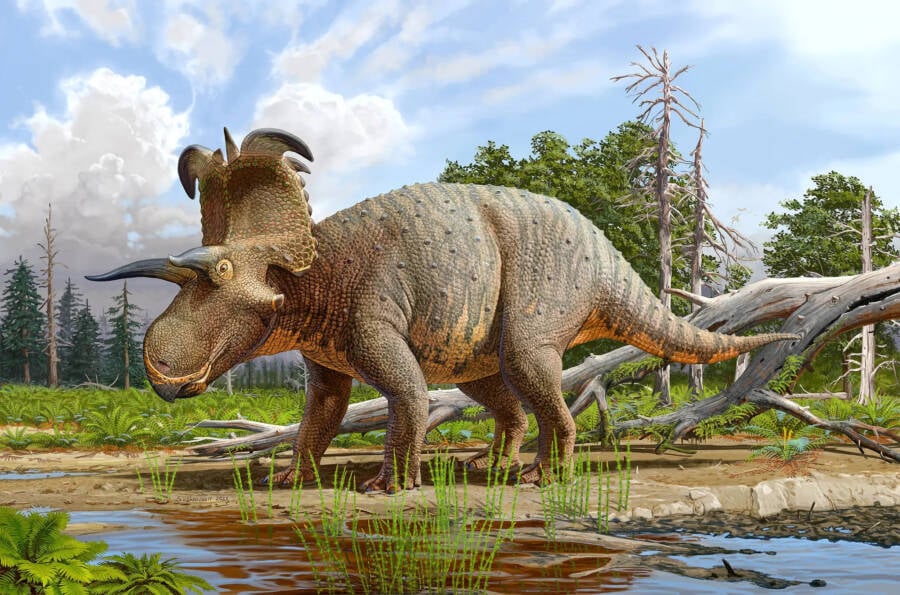TheLokiceratops rangiformis, whose relatives include theTriceratops, roamed what is now North America over 78 million years ago.
Sergey Krasovskiy / Museum of EvolutionTheLokiceratops rangiformis , one of the largest ceratopsian dinosaurs .
In 2019 , palaeontologist working in Montana unearthed the fossilized remains of a foreign horn dinosaur . After reconstructing the specimen , the squad now believe they ’ve see a brand new species .
Researchers name the dinosaurLokiceratops rangiformis , or “ Loki ’s horned boldness that looks like a caribou , ” a reference to the Norse god Loki . This horned colossus is a fellow member of the ceratopsids , a group of herbivores best make love for their impressive head frills .

Sergey Krasovskiy / Museum of EvolutionTheLokiceratops rangiformis, one of the largest ceratopsian dinosaurs.
Now , this discovery is challenging former musical theme about tusk dinosaur ’ phylogenesis and variety over 78 million class ago .
Fossils Of A Great Horned Dinosaur Are Discovered In Montana
Andrey Atuchin / Museum of EvolutionThe reconstructed skull of theLokiceratops rangiformis .
According to astudypublished in June 2024 , researchers digging in the Badlands in northern Montana in 2019 excavate the fossilized remains of theLokiceratops rangiformis , one of the great ceratopsian dinosaur to ever range the Earth .
After going through the scrupulous physical process of put the fossils together , researcher were astounded at the size of theLokiceratops rangiformis’horns .

Andrey Atuchin / Museum of EvolutionThe reconstructed skull of theLokiceratops rangiformis.
“ Reconstructing the skull of Lokiceratops from wads of pieces was one of the most thought-provoking undertaking my squad and I have ever face up , ” Brock Sisson , one of the discipline authors , posit in apress releasefrom the University of Utah . “ But the thrill of bringing a 78 - million - year - older dinosaur to lifetime for the first time was well worth the effort . ”
Over 78 million years ago , the enceinte hornedLokiceratops rangiformiswould have roamed the wilds of modern - day Montana . At the time , the area was part of the former Cretaceous island continent Laramidia and was primarily swampland and flood plain .
Fabrizio Lavezzi / Evolution MuseumAn aesthetic rendering of theLokiceratops rangiformisin the swampland of modern - Clarence Shepard Day Jr. Montana .

Fabrizio Lavezzi / Evolution MuseumAn artistic rendering of theLokiceratops rangiformisin the swamps of modern-day Montana.
TheLokiceratops RangiformisReveals Its Unique Secrets
Fabrizio Lavezzi / Evolution MuseumAn artistic rendering of the dinosaur ’s skull and massive French horn .
Unlike other ceratopsians , theLokiceratops rangiformisdid not have a olfactory organ horn . However , like the residuum of its closest relatives , the dinosaur did have a clear-cut bony plate , called a frill .
Not only does the Lokiceratops gas a pair of massive brow horns , but the curved , asymmetrical car horn on the back of its frill are the big ever found on a horned dinosaur .

Fabrizio Lavezzi / Evolution MuseumAn artistic rendering of the dinosaur’s skull and massive horns.
“ This new dinosaur advertize the envelope on bizarre ceratopsian headgear , romp the largest frill saddle horn ever learn in a ceratopsian , ” Joseph Sertich of the Smithsonian Tropical Research Institute put forward in the press release .
research worker estimate that the Lokiceratops mensurate 22 feet in length and weighed over 11,000 pounds , roughly the same as an African bush elephant .
Loewen & Sertich et al . , PeerJ , 2024 , NASAThe size of theLokiceratops rangiformiscompared to human existence .

Loewen & Sertich et al., PeerJ, 2024, NASAThe size of theLokiceratops rangiformiscompared to human beings.
This find has also sit interesting questions about the diversity of horned dinosaur . antecedently , paleontologists think that only two horned dinosaur species could coexist in one arena at a time . In their study , researchers key out five species simultaneously living together .
“ Rapid development may have led to the 100,000- to 200,000 - year turnover of individual metal money of these horned dinosaur , ” stated fossilist Mark Loewen , one of the study ’s carbon monoxide - lead authors , according toScience Alert . “ Lokiceratops helps us understand that we only are scratching the surface when it come to the diverseness and relationships within the category tree diagram of horned dinosaurs . ”
TheLokiceratops rangiformiswill be on display at the Natural History Museum of Utah in Salt Lake City for the next six months .
After translate about the Lokiceratops , dive into the story of theQuetzalcoatlus , the largest flying dinosaur to ever be . Then , read about themegalodon , the 60 - invertebrate foot shark that once was the sea ’s top predator .